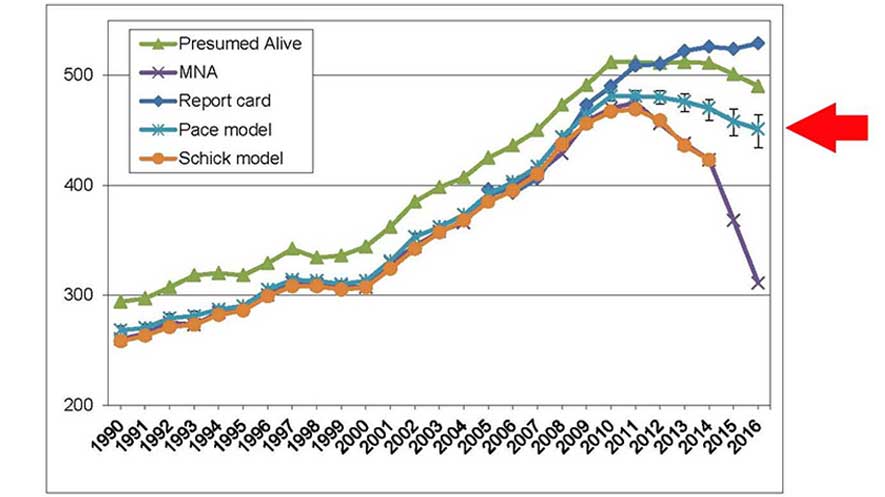The North Atlantic Right Whale Consortium is extremely concerned about the population status of the North Atlantic right whale.
Heather Pettis of the New England Aquarium, and Executive Administrator of the Consortium, reports that the catalogued right whale population through the end of 2016 was estimated at 529 individuals (previous estimates were 524 for 2015 and 526 for 2014), while modeling results from Richard Pace of the Northeast Fisheries Science Center estimate the population through 2016 as 451 individuals.
Factors contributing to uncertainty about the exact remaining population include a shift in whale distribution that has reduced both the number of sightings and the percent of the population seen annually since 2011. Because Pace’s model takes into account many factors, including whales not sighted, to produce an estimate associated with some confidence. For the year ending in 2016, the Consortium prioritized the Pace model estimate of 451 individuals alive over the Catalog estimate.
The numbers of births and mortalities contribute to the concern. In 2017, there were five calves born (the 10-year average is 20), with an average calving interval of 10 years (the 10-year average is 4 years). There were no first-time mothers in 2017.
Heather Pettis, New England Aquarium, reported that, of the reproductive females available to calve in 2017, only 7% actually did calve. For mortalities, 16 mortalities have been reported thus far in 2017, 4 in U.S. waters and 12 in Canadian waters. The report on the Canadian mortalities (Incident Report: North Atlantic Right Whale Mortality Event in the Gulf of St. Lawrence, 2017) was released by the Marine Animal Response Society, Halifax, Nova Scotia, on 5 October 2017 and can be found at marineanimals.ca under publications.
MARS Right Whale Incident Report from Jarrett Corke on Vimeo.
Could the decline lead to extinction of the right whale? Not if NOAA’s National Marine Fisheries Service (NMFS) can help it. Speaking to ABC News, John Bullard, the Northeast Regional Administrator for NOAA Fisheries, “You do have to use the extinction word, because that's where the trend lines say they are,” Bullard said. “That's something we can't let happen.”
NOAA’s NMFS /Greater Atlantic Regional Fisheries Office (GARFO) released its North Atlantic Right Whale 5-Year Review on 20 October 2017, which includes recommended actions to help the species recover―some of which are underway. These include convening or participating in a bilateral U.S./Canadian transboundary working group to reduce ship strikes and fishing gear entanglements, and reinitiating consultation on the Biological Opinions for several Fishery Management Plans under the Endangered Species Act (an update that considers new information on right whale biology and possible effects on fisheries). The recommendations also include evaluating the effectiveness of the Atlantic Large Whale Take Reduction Plan and the Ship Speed Rule to determine whether it may be necessary to modify or extend these protections for right whales. Additional responses and actions are underway.
GARFO announced that a dedicated Right Whale Recovery Coordinator in the Greater Atlantic Region has been appointed to focus efforts on recovery ―Diane Borggaard, a biologist with 20 years of experience in species recovery. Identifying the mission and members for the North Atlantic Right Whale Recovery Team is underway.
The Consortium also reports that Mark Baumgartner, Woods Hole Oceanographic Institution, and President of the Consortium, put forward a proposal for an International Working Group to Reduce Human-Caused Right Whale Mortality. The sole function of this independent group will be to recommend actions to reduce human-caused right whale mortality. The transboundary recommendations will be presented to both Canadian and U.S. governments.



